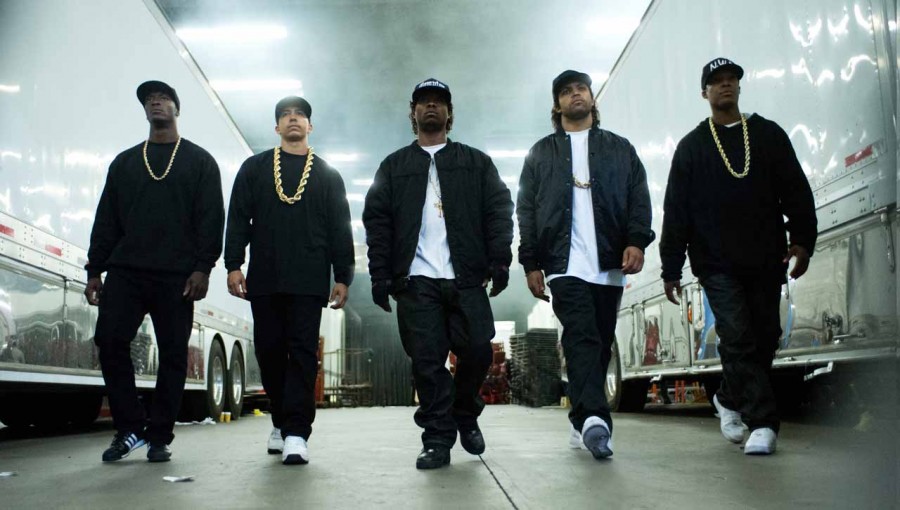“Straight Outta Compton”: Hip–Hop/America’s High and Low Notes
The biopic “Straight Outta Compton” puts a Hollywood spin on the rise and fall of NWA, one of hip–hop’s most influential groups. It shows why their line “fuck the police” has been an American anthem since the 1988 release of the retaliation song.
The film begins on the poor, often murderous streets of Compton. This part of Los Angeles, Ca. is known for drugs, violence, and LAPD racism– the reasons for retaliation. It’ll eventually be known for hip–hop legends Dr. Dre, Eazy-Z and Ice Cube, artists who pave the way for rough, story-telling rap that has become threaded deep in American culture.
Dre is played by Corey Hawkins, Eazy by Jason Mitchell, and Ice Cube by the rapper’s son O’Shea Jackson Jr. Other NWA members include DJ Yella (Neil Brown Jr.) and MC Ren (Aldis Hodge).
The film begins with the drug dealer Eric Wright, AKA Eazy-E. He has the money. The talent is Andre Young (Dr. Dre), an altruistic, upcoming DJ who is struggling to find venues for the music he creates. O’Shea Jackson, or Ice Cube is the lyricist who calls himself the flyest poet around; he isn’t afraid to spill his anger over a microphone.
It turns out thousands and thousands of Americans want this anger, want these inner-city stories told loud with turn tables and harsh rhymes. Don’t think it’s art? You’re not alone. Think it’s setting a bad example? Who cares? They are, like all great storytellers, telling what they know.
This is a major contention in the movie– the music’s content versus a society that doesn’t want to hear about the raw and black parts of the country. The music is empowerment, giving voice to those who are stopped by police and thrown to the ground for their skin color. The film isn’t afraid to show this on multiple occasions, and uses real Rodney King footage for authenticity. The 1991 incident falls in the middle of the story, which begins in 86’ and ends in ’95 with the untimely death of an NWA member. The film also borrows real news footage that depicts the dangers of music that advocates violence against police.
Not everything is about racial tension and corrupt cops. NWA’s music is also a means for money and power, both of which cause corruption. Viewers get a look at how Compton settles beef– with broken noses, backstabbing and guns pointing. Constant violence is another NWA theme.
The charisma of each character made me cheer. The onscreen chemistry between the fake NWA members made me believe I had entered a time machine. Contrasting the film’s dark themes is light banter and comedy. There’s an authentic brotherhood reenacted that made me wish NWA was invincible. Truly, my heart pounded at the rise of the hip–hop super group. It prepared for a break when the team faced adversity outside and within.
One of the best acting performances is by white-haired Paul Giamatti, who plays NWA’s music manager Jerry Heller. Heller and Eazy-E co-create Ruthless Records, giving the group a platform to lock-in radio play and tour dates.
Giamatti brings to life the struggle of a music manager who cares about Eric/Eazy, but about money more. Heller, who is white, is allowed to tell police that “they are a disgrace” for harassing his musicians. He’s also allowed to make more money than the artists who are spending weeks in the studio creating their debut album “Straight Outta Compton.”
O’Shea Jackon Jr. is a spitting image of a young Ice Cube. He brings a fiery performance; he won’t settle for living under ‘the man’s’ orders, whether that be police, Heller or any other who gets in the way of his money and freedom of speech.
Jackson Jr. explodes on stage, rapping with explicit intensity. He, along with the other actors, became musicians for the film, re-recording NWA’s entire album. Getting to hear the actual actors rap gives the movie an authenticity that couldn’t exist if they merely mouthed the words of the real Dre, Cube and Eazy. The film uses a combination of original and re-recorded rhymes, giving the viewer front row seats.
Jason Mitchell is a star in the film. His Eazy-E is spunky, driven, and contains an authentic human balance of selfishness and care for others.
Throughout the film Corey Hawkins remains a focal point. He does a good job at playing a young Dr. Dre. Dre is calmer than Cube, and truer to the music than Eazy.
No acting was Academy Award worthy, and scenes with tears weren’t as believable as scenes of anger and passion.
Loud scenes of sold out concerts stick in my mind. The shots move from the nosebleeds to the sweat beads on Eazy and Cube’s brow. The slow motion battle between united city gangs and armored police forces are among cinematographer Matthew Libatique’s best camera work.
With Dre and Cube being producers of the film, I couldn’t help but wonder if this is how courageous the young rappers were– then I remembered no matter how real the film felt, it’s Hollywood and just one telling of the real rise and fall of NWA. Yet, there were bigger truths that can’t be denied even when recreated by Hollywood.
The film is directed by F. Gary Gray, known for “The Italian Job,” “The Negotiator,” and “Friday.” Gray says NWA’s story is a part of American history that needs to be told now.
If one is a fan of hip–hop, the film is a must see. If one wants to learn more about what kind of artists are behind hip–hop, the film will teach. When one sits to watch and listen they can’t help but remember the real police brutality and inner city violence that is happening right now.
Travis LeClair joined the Basement Medicine staff in Spring 2014, assuming the position of staff reporter.






